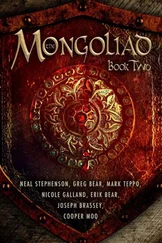Neal Stephenson - The Mongoliad - Book One
Здесь есть возможность читать онлайн «Neal Stephenson - The Mongoliad - Book One» весь текст электронной книги совершенно бесплатно (целиком полную версию без сокращений). В некоторых случаях можно слушать аудио, скачать через торрент в формате fb2 и присутствует краткое содержание. Город: Las Vegas, Год выпуска: 2012, ISBN: 2012, Издательство: 47North, Жанр: Эпическая фантастика, Фэнтези, на английском языке. Описание произведения, (предисловие) а так же отзывы посетителей доступны на портале библиотеки ЛибКат.
- Название:The Mongoliad: Book One
- Автор:
- Издательство:47North
- Жанр:
- Год:2012
- Город:Las Vegas
- ISBN:978-1-61218-236-0
- Рейтинг книги:5 / 5. Голосов: 1
-
Избранное:Добавить в избранное
- Отзывы:
-
Ваша оценка:
- 100
- 1
- 2
- 3
- 4
- 5
The Mongoliad: Book One: краткое содержание, описание и аннотация
Предлагаем к чтению аннотацию, описание, краткое содержание или предисловие (зависит от того, что написал сам автор книги «The Mongoliad: Book One»). Если вы не нашли необходимую информацию о книге — напишите в комментариях, мы постараемся отыскать её.
The Mongoliad: Book One — читать онлайн бесплатно полную книгу (весь текст) целиком
Ниже представлен текст книги, разбитый по страницам. Система сохранения места последней прочитанной страницы, позволяет с удобством читать онлайн бесплатно книгу «The Mongoliad: Book One», без необходимости каждый раз заново искать на чём Вы остановились. Поставьте закладку, и сможете в любой момент перейти на страницу, на которой закончили чтение.
Интервал:
Закладка:
Raphael’s attention wandered. He took note of several niches that had been chiseled into the walls. Some of these were occupied by corpses wrapped up in shrouds. Others were vacant except for jumbled blankets and ragged, dirty furs.
Roger noticed the same thing and turned back, his face incredulous. “People sleep down here?”
Raphael made an effort not to laugh. Vera would hear it and be offended. “Perhaps during the worst days of the Mongol siege,” he suggested. “But I cannot believe that the good sisters would make a habit of it.”
The passage forked from time to time, and whenever it did, Vera led them into what she deemed the correct path, while making some comment to Percival about what exhibits they might have found if they had chosen to go the other way. In most cases, these were holy wonders and relics of various descriptions, but it seemed that some tunnels led off in the direction of churches and monasteries elsewhere in the city.
“Every godly building in this town,” he muttered to Roger, “is, it seems, connected by this subterranean network.”
“Good thing for them the Mongols never found that out,” Roger remarked.
Raphael shuddered. “I doubt they would venture into a place such as this one. No victory would be worth it.”
“Which leads to the question…” Roger began, then stifled himself.
“What the hell are we doing here? Going on a quest, of course.”
Raphael got the sense that they were approaching some crisis, for the passage had become quite difficult to negotiate, being nothing more than a series of air pockets of varying sizes and shapes, joined by openings that had to be crawled through or climbed up to, with only a few chisel strokes in the slick stone to serve as footholds. Vera had to stop and think for a disturbingly long time at some of the turning points. But then, noting a concentration of scorch marks left by the torches and tapers of pilgrims who had gone before, she finally led them around the curve of a boulder and through a crevice that was invisible until almost the moment they passed through it. They entered into a flat-floored chamber large enough for the four of them to stand comfortably and look about.
The contents of the room were not as interesting, to Raphael, as the faces of his companions: Vera, whose sense of duty and hospitality could not fully hide her impatience; Roger, incredulous that he was down in a place like this when he was supposed to be riding east to kill the Great Khan; both of them looking curiously at Percival, whose face was alert, curious, and avid.
Clearly the chamber was a place of importance. Set into the rock all round were wrought torch brackets, currently vacant; smudges on the stone above them proved that they had once been used to illuminate holy rites of some description. The fainter glow of their candles illuminated carvings along the walls, here visible and there hidden by shadow—painted effigies of figures that Raphael assumed were famed to the place’s history. A tall and terrible figure sat in a rigid, dignified posture upon a throne, defied by three figures upon horseback, gleaming swords wavering behind the sheen of hazy torchlight.
“Koschei the Deathless,” Vera said, following Raphael’s stare. “An evil spirit, a tyrant tsar, vanquished long ago. You stand in the tomb of the one who led his brothers to slay him.” She turned to where a marker, chiseled in stone, was set into the wall. The words were nearer Greek than Ruthenian.
“Saint Ilya’s grave,” Raphael murmured upon deciphering the name on the stone.
“He has held vigil in this place for years uncounted since vanquishing our land’s enemies,” Vera said, reverently touching the stone. Then she turned to look Raphael in the eye. “There is no safer place for secrets than here.”
After a moment, Percival knelt before the marker and crossed himself. “I thank you for your trust in showing us this, Sister Vera. To pay homage at the tomb of such a one is an honor few men receive.”
“They called him Chobotok ,” Vera said. “It means ‘boot.’ For he fought off numerous foes with only his shoe as a weapon.”
Raphael’s eyes darted to the face of Roger, who was about to burst out into open laughter. He lashed out with his free hand and laid it on Roger’s shoulder, giving him a little shake. Startled, Roger spun away and met his eye. Raphael shook his head minutely, then glanced toward Percival, who was still kneeling and mumbling a Latin prayer.
“Is Saint Ilya speaking to you, Brother?” Raphael asked gently. “For there must be some reason why God has led us to this place.”
After a long and agonizing silence, Percival spoke. “Saint Ilya is silent on the matter,” he admitted.

Trying to catch her breath from the headlong run down the slope—not to mention calm her pounding heart—Cnán let Finn tell Feronantus and the others what they had seen. He seemed annoyed at being asked to speak at length, but after a few sentences, he fell into a surprising loquaciousness.
When they had first departed from Legnica, the hunter’s rough version of Latin had been almost incomprehensible to her, but now, after being in his company for nearly two months, she found she could understand him.
“What could they hope to find in these caves?” Feronantus asked when Finn finished.
The hunter shrugged. “There is nothing of value within those walls. What the Livonians want lies elsewhere, but they have to go through the caves to get it. Otherwise they would have brought their horses.”
“A raiding party,” Eleázar spat.
“But raiding what?” Yasper asked, stroking his beard. He looked at the church on the other hill, the onion-topped domes peeking over the top of the crumbling walls. “The cathedral?”
“Percival…” The name was out of Cnán’s mouth before she could stop it, and she mentally kicked herself for the slip of her tongue. It was her heart, she fumed, still beating so hard from the run downhill that had betrayed her.
“Yasper,” Feronantus ordered, “stay with Finn and Cnán. Keep a watch on the monastery. If the Livonians return, follow them.” He gathered up his reins and snapped them, getting his horse’s attention. “The rest of us will ride for the cathedral, to warn our brothers.”
Istvan chortled, kicking his horse in the ribs. Clearly the Hungarian was eager for another opportunity to cross paths with the Livonians. His horse sprang forward, and he led the party as they galloped along the road, heading around the hill.
Yasper waved away the dust kicked up by their departing companions, and then he hooked a leg over his saddle and slid to the ground. “Well…” he started, rustling around in his saddlebags, gathering a few oddments and trinkets. “I guess we’d better get started.” He grabbed one of the two jugs he had found earlier and forced it and the rest of the items he had selected into a large satchel he hung around his waist.
“Started…?” Cnán asked.
Yasper squinted up at the monastery. “Uh-huh.”
“Feronantus said we were to wait and see if they returned. He didn’t say anything about going up there.”
Yasper shrugged. “He didn’t say we shouldn’t, either.” He toyed with the small vial of mint oil. “Did it really smell that bad?”
Cnán snatched the vial from his hands. “Worse than you can imagine,” she said. She smeared the ointment liberally on several fingers and slathered her nose before returning the bottle to the alchemist. “We’re just going to keep an eye on them,” she said. “From outside the walls.”
“Of course,” Yasper said nonchalantly, as if she had just commented on the weather or the color of his tunic. He rubbed the ointment into his mustache, twirling the long strands idly with his oily fingers. “Only two?” he asked.
Читать дальшеИнтервал:
Закладка:
Похожие книги на «The Mongoliad: Book One»
Представляем Вашему вниманию похожие книги на «The Mongoliad: Book One» списком для выбора. Мы отобрали схожую по названию и смыслу литературу в надежде предоставить читателям больше вариантов отыскать новые, интересные, ещё непрочитанные произведения.
Обсуждение, отзывы о книге «The Mongoliad: Book One» и просто собственные мнения читателей. Оставьте ваши комментарии, напишите, что Вы думаете о произведении, его смысле или главных героях. Укажите что конкретно понравилось, а что нет, и почему Вы так считаете.







